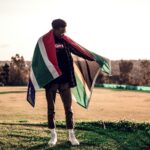Digital’s revolution of media, marketing and entertainment didn’t just rewrite the rulebook in terms of value, impact and ROI, it forced change and the development of a new skills set on brand owners, marketers and their agencies.
And, while some have the luxury of time to make fundamental shifts to the way they work while the market catches up, sponsors don’t have the same leeway if they want to stay in the game and make it worth their while.

This is the view of Brand Inc.’s newly appointed Head of Sponsorship, Izak van der Walt. Brand Inc. is the creative sponsorship strategy and implementation agency within the HaveYouHeard Group of specialist creative communications businesses.
“Unfortunately, when it comes to sports sponsorship in the digital ear, most traditional sports agencies aren’t built in a way that helps brands navigate the new world of sports sponsorship,” he said.
“Firstly, they are rights lead and are built with a commercial strategy head and an operational implementation body. Second, they work in silos negotiate rights and either implementing those rights themselves or abdicating the task to a creative agency or department to work within the parameters of the sponsorship rights agreement.
“But this isn’t good enough anymore. Providing infrastructure in exchange for in-stadium, on-kit and broadcast presence isn’t enough. To play a part in the story today, brands have to be collaborative partners to the sport by enhancing the experience before, during and long after the game has ended.”
According to van der Walt, brands shouldn’t walk away from sponsorship. Even though the rulebook has changed, sponsorship is still a valued tool for building brand affinity with consumers who believe that a particular brand shares common values with them, he said.
These shared values help build a relationship built on emotional connection and sponsorships remain the perfect place to build this affinity. However, brands need to clearly articulate their values, personality, essence and view of the world through the content they produce in order to provide the opportunity to build affinity with their audience.
Critically, according to van der Walt, driving Big Brand Presence isn’t enough. People want entertainment, information, inspiration, access and ability to be an active participant in the games they love, not just viewers. They’re spoiled for choice; they’re savvy and they’re selective.
His advice for brands looking to maximise the impact of their sponsorships includes:
- Start from the end:
Powerful sponsorship platforms are founded on considered rights packages that account for every execution, activation and amplification opportunity they’ll lead to in the end, from the outset. You need to combine and align the skillsets of key strategic, creative, commercial and executional players from day one to work from both sides of the project timeline in identifying value opportunities that will simultaneously build a strong argument for the relationship and result in the best value for all concerned, including the end consumer.
- Build on a solid foundation:
The challenge to building this emotional connection is that very few brands have clearly defined what their values are in a way that is succinct, consistent and relevant to the sponsorship category and thus find it difficult to find a clear role or authentic link to the property. Red Bull has a very clear foundation, which runs through every aspect of their communication whether it be digital, events, sports or content. This has seen the brand become one of the fastest growing brands in the world over the past decade as well as transitioning from an energy drink who creates cool content to a fully-fledged media house which sells an energy drink.
- Be a valued member of a community:
Brands looking for the largest audience miss the opportunities to tap into smaller, more invested audiences and properties that are more closely linked to their values to build relationships with them beyond advertising and turns them into advocates.
- Be on the right stage, not just the big stage:
The World Surfing League speaks to their audience in a relevant way, because they understand them. They host real world events, broadcast via livestream, providing highlights reels almost instantaneously, as well as docu-series and podcasts. They promote sustainability through the ‘We Are One’ ocean initiative and sustainable execution of live events. They ensure that men and women have equal prize money and status at each world tour stop, and leverage their top surfers as influencers across multiple platforms. Finally, they broadcast the content within their platforms because it is the way their audience consumes content and because it gives them first party data.
- Think like a publisher and purpose build content:
Data shows that 51% of people use YouTube to learn something new. An indicator that content must be both entertaining and useful if it’s to be noticed. By focusing on the reason for a piece of content to exist – its purpose – and who we’re making it for, we understand what form it should take, which channels it should live on and how we’ll maximize its ability to positively influence its intended audience.
- Split the content atom:
A single piece of content shouldn’t only be measured by how many engagements it gets, but how it can be reimagined, reformatted, repurposed and reskinned for the full gamut of mediums and channels that the audience engage with. This not only maximises reach and awareness for the message, but multiplies the value of each and every individual piece of content produced.
- Drive the narrative to go beyond the results:
By driving the narrative and building emotional connection to a brand, you de-risk the sponsorship property, removing the unpredictability of sports sponsorship linked to results. Tottenham Hotspur’s ‘All or Nothing’ documentary series has not only provided a new lens through which fans can watch their team, it is having a positive impact on feelings towards the club -for example in the UK and US. Despite a lacklustre season in 2020, which saw the sacking of Jose Mourinho, more than 50% of viewers claim to have a positive feeling towards the team after watching the series.
- The BRC announces changes to the board and updates for 2025 - 17th December 2024
- Top 50 DSTV TV programmes – October 2024 - 12th November 2024
- Top 50 FTA TV programmes – October 2024 - 12th November 2024




